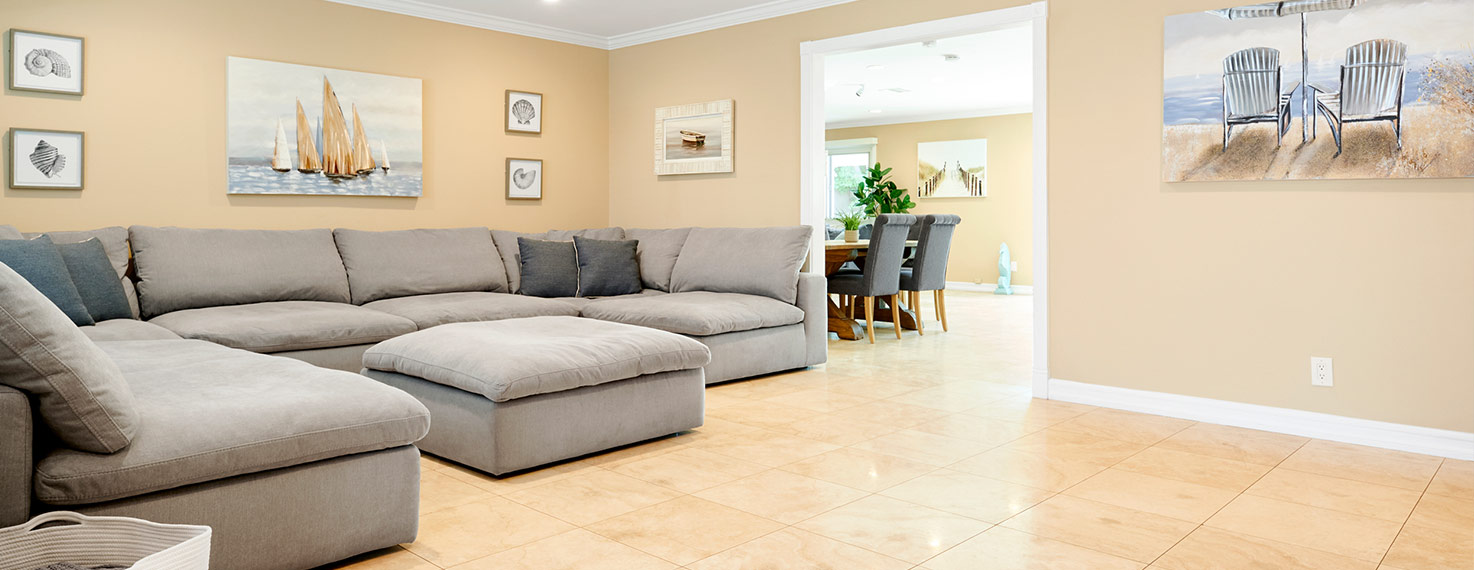
Home » Treatment Programs » Sober Living
A Guide to Sober Living: What it is, Why, and How
- Authored by Joe Gilmore
- Clinically Reviewed by Jenni Busse
- Last Updated 04/03/2024
Give yourself the tools to live your best sober life
- By Joe Gilmore
- Reviewed by Jenni Busse
- 04/03/2024

WHAT IS SOBER LIVING?
Sober living is an option after the intensive treatment provided in inpatient care. It can help with adjusting to living sober outside of rehab and ease the transition back to your normal life. In a sober living program, you’ll live in a supervised home with a group of others who are also on the road to recovery. Sober living houses have structured schedules, meetings, and rules to help promote a positive environment free from temptation and distractions.
You can join a sober living home immediately after rehab, or you may find that adjusting to life outside of rehab is difficult. That’s when sober living can help with the transition from rehab to your normal environment. Not everyone who goes through drug or alcohol detox and rehab will need this step, but sober living can help reinforce what you’ve learned in rehab. With the assistance of a support network, it’s less likely that you will relapse.

WHAT IS IT LIKE TO LIVE IN A SOBER LIVING HOME?
Living in a sober home will be similar to living in rehab, but here, you will continue to work or go to school and have financial independence. You’ll still attend group meetings and have a support system, but you can come and go out of the home whenever you’d like. There still are curfews, a no-tolerance policy toward alcohol and drugs, and other rules in place to ensure that residents can thrive in a positive, encouraging environment.
Sober living is also called a halfway house because you’re halfway done with recovery. It isn’t just sharing a house with rehabilitated roommates. The home provides a less structured, more independent environment than rehab, but offers more guidance than returning home to an unstructured environment. Sober living homes also help their residents succeed by equipping them with invaluable life skills before returning to living independently, such as:
- FINDING A JOB
- FINDING A HOUSE AFTER TREATMENT
- LIVING SOBER AT HOME
- SOCIAL SKILLS
- FIXING FAMILY RELATIONSHIPS
- SUPPORT NETWORK
- MANAGING TRIGGERS
- PURSUING EDUCATION
SOBER LIVING VS A HALFWAY HOUSE
Sober living homes and halfway houses are both types of residential environments designed to support those in recovery from addiction. While there are similarities between these two types of community, there are also important differences to consider.
Sober living homes are typically designed to provide a supportive and structured environment for those who have already completed a formal addiction treatment program and are working towards independent living while maintaining their sobriety. Sober living homes are generally less strict than halfway houses and allow residents more independence in terms of curfew, visitors, and access to technology. Residents in sober living homes are expected to maintain their sobriety, participate in group meetings, and contribute to household responsibilities while meeting all expenses.
Halfway houses, on the other hand, are typically more structured and may be mandated as part of a court-ordered treatment program. Halfway houses are often reserved for those who have completed a residential treatment program and require additional support and supervision as they transition back into the community. Residents in halfway houses may be subject to more stringent rules, including mandatory curfews and drug testing.
Another key difference between sober living homes and halfway houses is the level of support and services offered. While both types of residential environments may offer access to counseling and support groups, halfway houses may offer more intensive therapy and medical services to address specific mental health needs.
Overall, both sober living homes and halfway houses can provide a supportive and safe environment for individuals in recovery to build a foundation for a healthy and fulfilling life in sobriety. The decision of which type of residential environment is best will depend on your specific needs and circumstances, as well as the level of support and structure you need to maintain your sobriety.
- FINDING A JOB
- FINDING A HOUSE AFTER TREATMENT
- LIVING SOBER AT HOME
- SOCIAL SKILLS
- FIXING FAMILY RELATIONSHIPS
- SUPPORT NETWORK
- MANAGING TRIGGERS
- PURSUING EDUCATION
WE ACCEPT MOST PPO INSURANCE
We work with most insurance plans to cover the costs of treatment.
WHAT ARE THE BENEFITS OF SOBER LIVING?
POSITIVE ENVIRONMENT
Many people recovering from drug addiction or alcoholism reassess their closest relationships and friendships, often finding that many relationships were grounded on substance abuse. By continuing your recovery process at a sober living home, you’ll surround yourself with peers committed to sobriety and embracing sober living. Enjoy the support, accountability, and positivity of peers when navigating this challenging transitional phase of your recovery at a sober living home.
SUPPORTIVE CARE
Many of those in the early phase of recovery find it challenging to move from the structured environment of residential rehab directly into independent living. At a sober living home, you can benefit from a house manager who will oversee operations, and you can count on other residents for help as you move toward independent sober living at home.
CREDENTIALED STAFF
The staff employed by sober living communities will be vetted and credentialed, giving you the confidence of a robust support system. Staff at sober living communities may also provide connections to other licensed and accredited professionals relevant to your recovery journey.
LOWER RISK OF RELAPSE
By choosing to pursue a challenging transitional phase of recovery at a sober living home, you may minimize the likelihood of relapse derailing your recovery before it gets traction. Addiction is a chronic and relapsing brain disorder with relapse rates of between 40% and 60% similar to the relapse rates of other chronic health conditions. Boost your chances of sustained sobriety by reaching out to Gratitude Lodge for sober living in California.
HOW LONG DO YOU STAY IN SOBER LIVING
The average stay in a sober living home is 90 days, but arrangements can be made for a longer stay. If you think you may have trouble staying sober in your own home environment after rehab, or your family has a negative attitude toward your recovery, a sober living or halfway house is a great solution to help you stay on track. In a sober living house environment, professionals are available to help you navigate major changes in your new life. They can also help you determine what length of stay is the right one for you.
As long as you are actively pursuing your recovery in some way, abiding by community rules, and paying all dues, you should be free to remain in a sober living community for as long as necessary. Everyone has a unique experience of recovery from drug addiction or alcoholism, and the best sober living communities account for this with a flexible approach.
ARE SOBER LIVING HOMES COVERED BY INSURANCE?
Most sober living homes require residents to pay their own rent and do chores. With some exceptions, sober living homes usually aren’t eligible for insurance coverage because they’re not considered a treatment facility by the government. This is because sober living homes don’t offer treatment as rehab facilities do. While this seems like a disadvantage, paying rent can help a resident continue responsible financial habits.
However, outpatient rehab that you may attend during your time in a sober living home may be covered by insurance. Some insurance policies may limit your care providers or may want you to contribute to the cost. The cost depends on your insurance policy deductible and your policy co-pay. Most treatment facilities can help determine if your insurance is eligible for outpatient rehab.
CALIFORNIA SOBER LIVING
Sober living in California has become an increasingly popular option for individuals in recovery from addiction. Sober living environments in California are typically designed to provide a supportive and structured space for individuals in recovery to transition back into independent living while actively maintaining their sobriety.
California sober living homes may offer a range of services and amenities, including:
- Access to individual and group counseling services
- Connection to 12-step programs and other recovery support groups
- Educational services
- Vocational development
- Assistance with employment
Some sober living communities in California may also offer specialized programs for those with co-occurring mental health disorders or other unique needs.
In addition to these services, sober living homes in California may help those in recovery from drug addiction or alcoholism to form supportive and meaningful relationships with peers in recovery, as well as access to fun sober activities and resources that promote wellness and personal growth.
Additionally, most sober living communities in California are located in areas with easy access to nature, helping you to embrace sober living in California, thriving rather than merely surviving.
Note: The term California sober living refers to a specific type of sober living environment that is prevalent in California and has become popular elsewhere in the world. The concept of California sober living is that individuals in recovery from addiction can live a sober lifestyle while still being allowed to use marijuana in a responsible and controlled manner in states where the use of marijuana is legalized. If you have developed an addiction to marijuana, reach out to Gratitude Lodge in Southern California for evidence-based treatment.

Our Partners
WE ACCEPT MOST PPO INSURANCE
Drug and alcohol rehab should be accessible to everyone. At Gratitude Lodge,
we work with most insurance plans to cover the costs of treatment.
CALIFORNIA SOBER LIVING FAQS
If you are interested in exploring sober living in California, see if you can find what you’re looking for with the most frequently asked questions we receive here at Gratitude Lodge in Southern California.
The term sober living generally refers to living a drug-free and alcohol-free lifestyle. The term is primarily applied to those in recovery from drug addiction or alcoholism. Sober living typically involves making a conscious decision to abstain from drugs and alcohol, and frequently involves actively working on recovery through participation in counseling, support groups, or other forms of therapy. In the context of a sober living home, sober living specifically refers to the living environment that is designed to support those in recovery by providing a substance-free space with a structured and supportive community. The rules and guidelines of the sober living house are intended to encourage sober behavior and prevent relapse, and residents are typically required to maintain their sobriety while living in the house. Sober living can be an important transitional step in the recovery process for those who have completed an inpatient treatment program and are transitioning back into everyday living.
Living a sober life can have many positive effects on your physical, emotional, and social well-being. Here are some examples of what can happen if you live a sober life:
- Improved physical health: When you stop using drugs and alcohol, your body can start to recover from the adverse effects triggered by substance abuse. You may experience improved sleep, increased energy, and better overall physical health.
- Better mental health: Substance abuse can have a negative impact on mental health, contributing to depression, anxiety, and other mental health disorders. When you live a sober life, you may experience improved mental health, increased emotional stability, and a greater sense of well-being.
- Stronger relationships: Addiction can strain relationships with friends and family. When you live a sober life, you can start to rebuild these relationships and form new, healthy relationships not grounded on substance abuse.
- Increased productivity: Substance abuse can interfere with job performance and productivity. When you live a sober life, you may experience increased motivation, focus, and productivity, leading to improved performance in the workplace.
Improved finances: Addiction can be expensive, and many people struggling with substance abuse experience financial difficulties as a direct result. Living a sober life can lead to improved financial stability and security.
Living sober can feel different for everyone and can depend on many factors, including history of substance abuse, duration of sobriety, and the specific challenges faced in maintaining sobriety. Here are some general experiences that individuals in recovery may encounter as they live a sober life:
- Clarity: One of the most commonly reported benefits of sobriety is increased mental clarity. When you’re not under the influence of drugs or alcohol, your mind will feel clearer and you can better focus on your goals and priorities.
- Improved mood: Many individuals report feeling happier and more positive after achieving and maintaining sobriety from drink or drugs. The ups and downs associated with substance abuse can cause mood swings and other emotional issues. Living a sober life can help stabilize mood and promote more positive emotions.
- Boosted energy levels: Drugs and alcohol abuse can be physically draining, triggering fatigue and lethargy. When you’re sober, you may feel more energetic and have a greater sense of physical well-being.
- Improved confidence: Achieving sobriety can be a major accomplishment, and many individuals report feeling this sense of pride and confidence overspilling into everyday life with positive results.
A sober living house, also known as a sober living community, is a residential setting where those in recovery from drug or alcohol addiction can live in a safe and supportive environment with peers undergoing recovery journeys and committed to sobriety. Sober living houses are often used as a transitional step for people who have completed an inpatient treatment program and are not yet ready to return to everyday living. Living in a sober living house provides a structured, drug-free environment with house rules and guidelines to help residents maintain their sobriety and develop life skills to support their recovery. Sober living houses typically have house managers who oversee daily operations and enforce house rules. Residents are usually required to be participating in active recovery. This may involve attending outpatient therapy sessions or engaging with peer support group meetings. Residents will also be expected to share household chores and responsibilities. Sober living homes do not provide addiction treatment, and these communities are not a substitute for rehab.

















